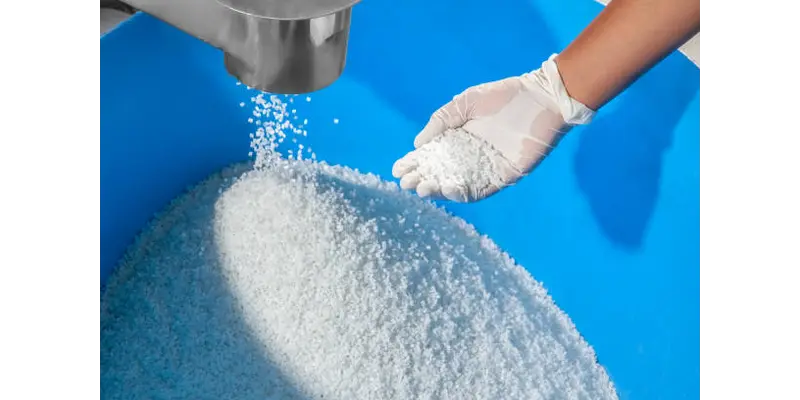If you want to ask, is Expanded Polystyrene Flammable?Then we have to analyze its scientific characteristics.
What is Expanded Polystyrene ?
Expanded Polystyrene (EPS) is a lightweight, rigid plastic material commonly used in packaging, insulation, construction, and model making. EPS is typically produced by adding a blowing agent to polystyrene resin and then molding it into shape through a process of expansion at elevated temperatures.
It resembles white foam and possesses excellent thermal insulation properties and impact resistance, making it versatile for various applications. EPS material is favored for its low cost, lightweight nature, and ease of processing, making it widely utilized in packaging, building insulation, art projects, and more.
Is Expanded Polystyrene Flammable?
The scientific properties of Expanded Polystyrene refer to its chemical composition and physical properties, which determine the behavior and performance of Expanded Polystyrene under various environmental conditions.

First, let’s take a look at the chemical composition of Expanded Polystyrene. EPS is a foam plastic composed of polystyrene (PS) molecules, where PS is a polymer polymerized from styrene molecules. This polymer has a specific molecular structure that gives EPS specific physical and chemical properties under temperature changes and external pressure.
One of the main characteristics of EPS is its lightness and closed-cell structure, which gives it excellent thermal insulation and shock-absorbing properties. Due to its low density and closed-cell structure, EPS has high insulation properties and is therefore widely used in building insulation materials and packaging materials. In addition, EPS has good pressure resistance and corrosion resistance, making it widely used in various applications.

In addition, When Expanded Polystyrene is exposed to fire or high temperatures, EPS can cause fires to spread rapidly. When exposed to fire, EPS shrinks, melts and produces thick smoke and toxic gases, including carbon monoxide and styrene, which may be harmful if inhaled. So fire prevention measures are required in some applications. Understanding the scientific properties of EPS helps us better understand the behavior and performance of EPS in different environments, so that we can better apply and manage this material.
Environmental impact and sustainability
Once traditional EPS materials are discarded, they often cause serious pollution and harm to the environment. Due to their non-biodegradable nature, they are considered one of the major sources of “white pollution”.
To solve the EPS waste management problem, recycled EPS pellets have emerged as a solution. Recycled EPS pellets are produced by recycling discarded EPS materials, processing them, and converting them into granular new materials. This process not only reduces the environmental impact of EPS waste, but also saves raw material resources and facilitates resource reuse.
By promoting the use of recycled EPS pellets, we can mitigate the environmental consequences associated with traditional EPS disposal methods. This method is in line with the principles of sustainable development and circular economy, converting waste into valuable resources, contributing to environmental protection and resource conservation. Additionally, the utilization of recycled EPS pellets supports the development of greener, more responsible methods of producing and consuming the material.
How to reduce EPS flammability?
In addressing the query “Is Expanded Polystyrene Flammable,” recent advancements have honed in on two key areas: the integration of flame retardant additives and the development of innovative fire-resistant coatings.
These tailored additives, specifically designed for EPS, bolster its resistance to fire without compromising its inherent properties. Meanwhile, the application of intumescent coatings on EPS surfaces creates protective layers upon exposure to heat, effectively slowing down the combustion process. These breakthroughs not only enhance EPS safety but also serve as crucial responses to concerns surrounding its flammability.

In summary, reducing expanded polystyrene pollution is critical to protecting our planet. By promoting recycling, developing alternative materials and advocating for policy changes, we can minimize the environmental impact of EPS and create a cleaner, healthier world for future generation.
Best practices regarding safety tips
Here are 6 practical tips for individuals or businesses using EPS products:
Storage: Store EPS materials in a cool, dry place, away from heat sources and direct sunlight. Avoid storing EPS near open flames or other sources of ignition.
Handling: Handle EPS products carefully to prevent damage or cracking, which may increase the risk of fire. Use proper lifting techniques and avoid dropping or crushing EPS items.
Installation: When installing EPS insulation or packaging materials, follow manufacturer guidelines and recommendations. Ensure proper ventilation during installation to minimize the build-up of potentially flammable vapors.
Fire prevention: Implement fire prevention measures in EPS use or storage areas. This may include installing fire detection systems, keeping evacuation routes clear and providing fire extinguishers or other firefighting equipment.
Disposal: Properly dispose of EPS waste through recycling whenever possible. Many recycling facilities accept clean EPS material for recycling, thereby reducing the amount of EPS sent to landfills where it can become a fire hazard.
Education: Train employees or personnel on the proper handling and storage of EPS materials and emergency response procedures in the event of a fire or other safety incident.
By following these safety tips and best practices, individuals and businesses can minimize fire risks and ensure the safe use of expanded polystyrene products. Remember to stay informed of fire safety regulations and guidance to maintain a safe environment when working with EPS.
